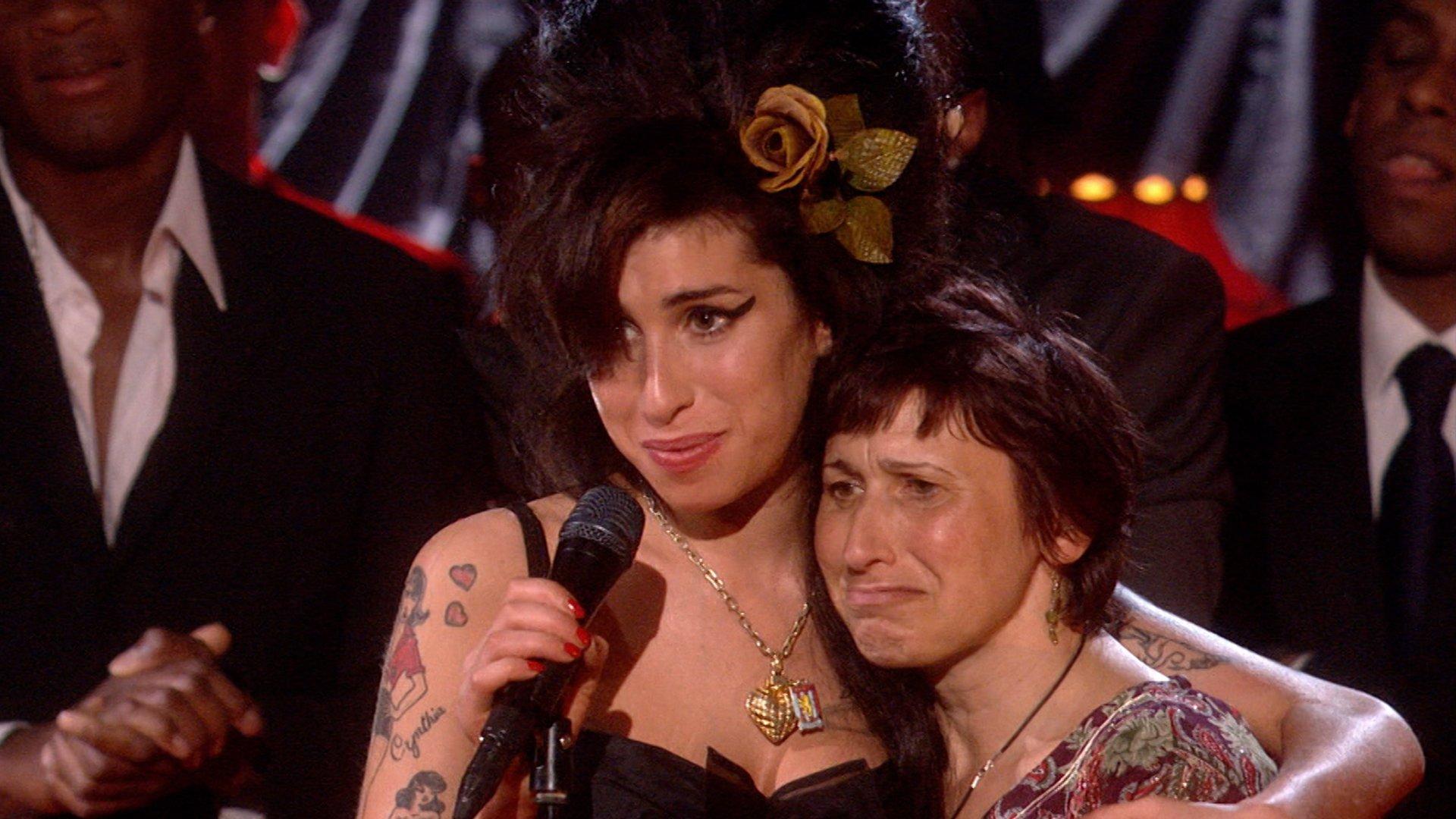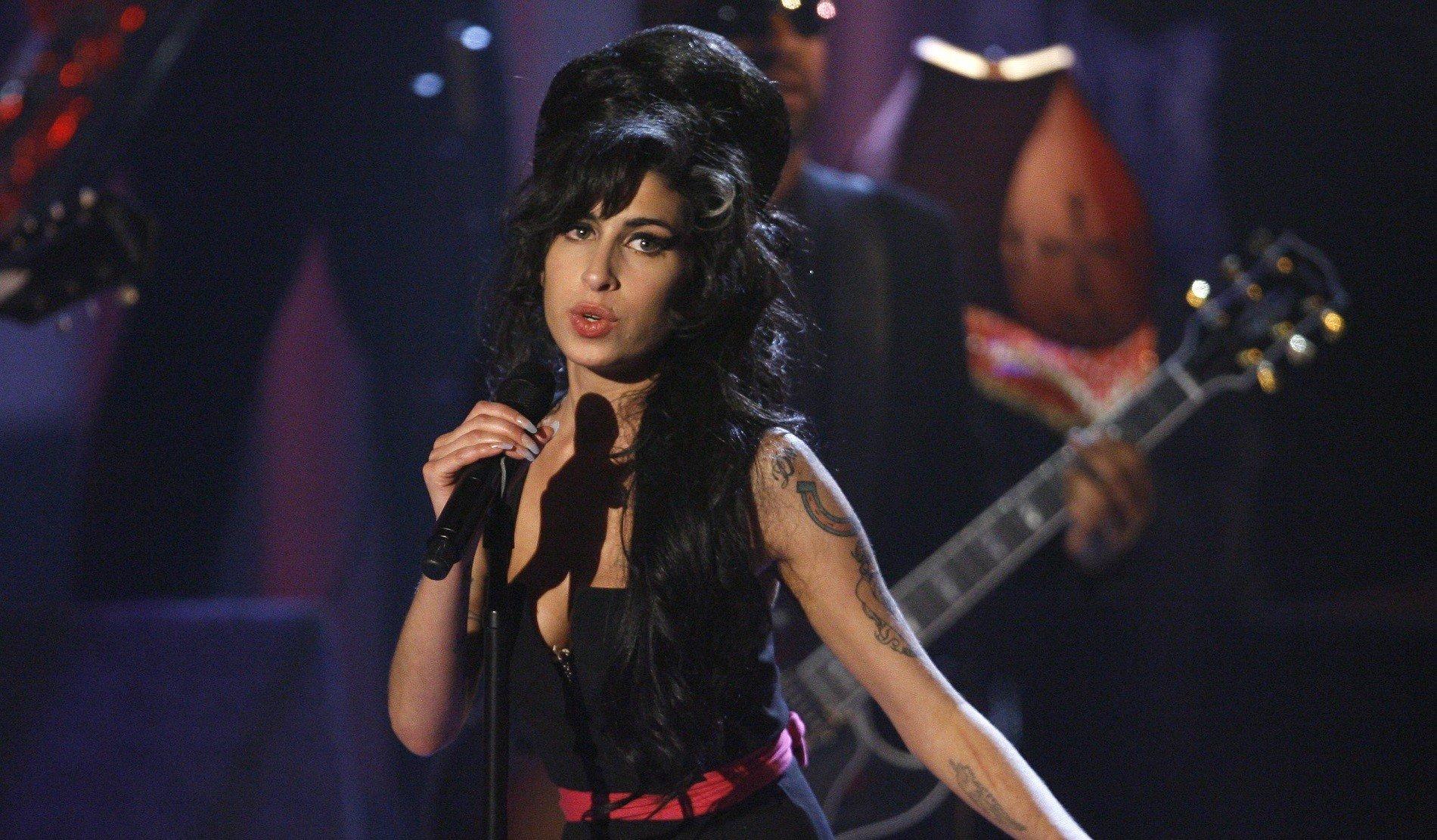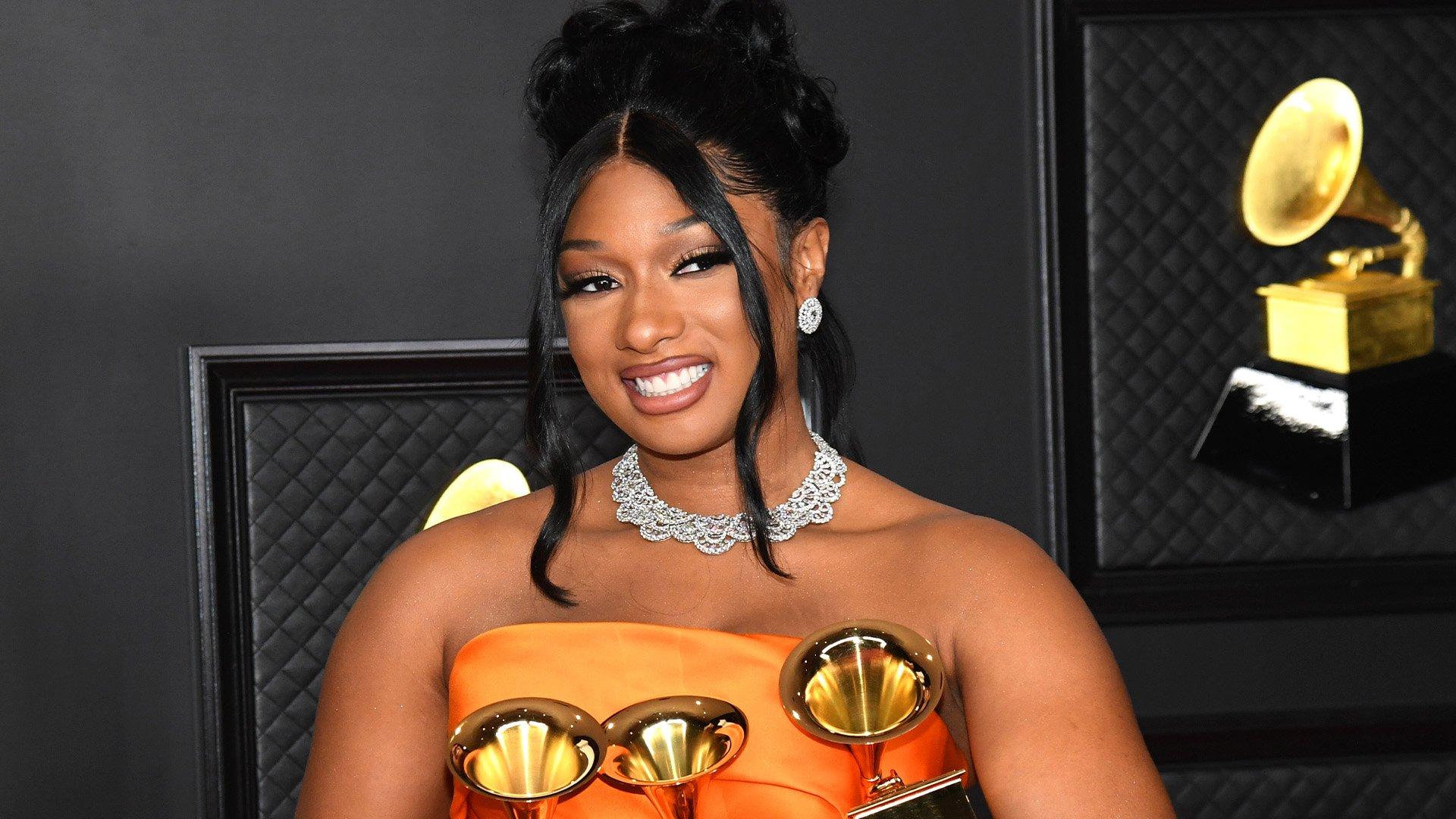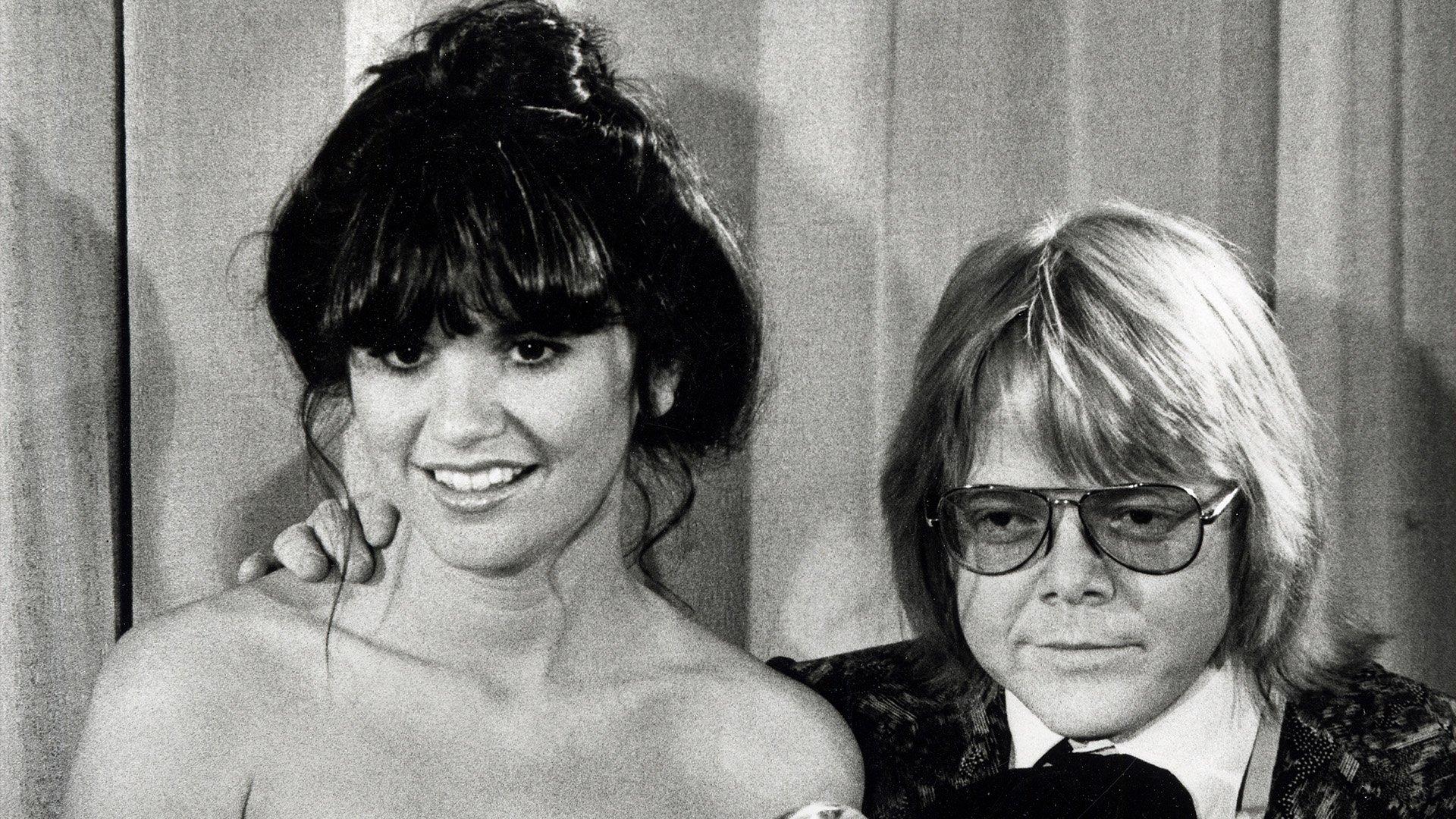Photo: Courtesy of the Recording Academy

news
GRAMMY Rewind: Watch A Stunned Amy Winehouse Win Record Of The Year For "Rehab" In 2008
At the 50th GRAMMY Awards in 2008, the first year she was nominated, Amy Winehouse took home five GRAMMY Awards, including Record Of The Year and Song Of The Year for "Rehab" as well as Best New Artist.
Editor's Note: This article was updated on May 17, 2024, for the release of the 2024 biopic, Back to Black.
When the world first heard Amy Winehouse's Back to Black in 2006, the album changed pop music forever with its nostalgic, trauma-stricken grief, becoming her most enduring legacy. The story of the beloved beehive-wearing chanteuse and her iconic album was recently encapsulated in the long-awaited biopic, also titled Back to Black.
In honor of the new film, revisit the 50th GRAMMY Awards in 2008, the year Winehouse won her first five GRAMMYs: Record Of The Year, Song Of The Year and Best Female Pop Vocal Performance for "Rehab," Best Pop Vocal Album for Back to Black, and the coveted Best New Artist.
In this episode of GRAMMY Rewind, watch a genuinely surprised Winehouse accept the GRAMMY for Record Of The Year for "Rehab" as she celebrates with her band, who'd that night backed her for a satellite performance from London. With her mom by her side, Winehouse thanks her label, collaborators, parents, and, most of all, "for London!"
That evening, the then-rising singer/songwriter took home four additional GRAMMY Awards, including Song Of The Year and Best Female Pop Vocal Performance for "Rehab," Best Pop Vocal Album for Back To Black, and Best New Artist.
We Only Said Goodbye With Words: Remembering Amy Winehouse 10 Years Later

Photo: Chris Polk/FilmMagic
list
How Amy Winehouse's 'Back To Black' Changed Pop Music Forever
Ahead of the new Amy Winehouse biopic 'Back To Black,' reflect on the impact of the album of the same name. Read on for six ways the GRAMMY-winning LP charmed listeners and changed the sound of popular music.
When Amy Winehouse released Back To Black in October 2006, it was a sonic revelation. The beehive-wearing singer’s second full-length blended modern themes with the Shangri-Las sound, crafting something that seemed at once both effortlessly timeless and perfectly timed.
Kicking off with smash single "Rehab" before blasting into swinging bangers like "Me & Mr. Jones," "Love Is A Losing Game," and "You Know I’m No Good," Black To Black has sold over 16 million copies worldwide to date and is the 12th best-selling record of all time in the United Kingdom. It was nominated for six GRAMMY Awards and won five: Record Of The Year, Song Of The Year, Best New Artist, Best Female Pop Vocal Performance, and Best Pop Vocal Album.
Winehouse accepted her golden gramophones via remote link from London due to visa problems. At the time, Winehouse set the record for the most GRAMMYs won by a female British artist in a single year, though that record has since been broken by Adele, who won six in 2011.
Written in the wake of a break-up with on-again, off-again flame Blake Fielder-Civil, Black To Black explores heartbreak, grief, and infidelity, as well as substance abuse, isolation, and various traumas. Following her death in 2011, Back To Black became Winehouse’s most enduring legacy. It remains a revealingly soulful message in a bottle, floating forever on the waves.
With the May 17 release of Sam Taylor-Johnson’s new (and questionably crafted) Winehouse biopic, also titled Back To Black, it's the perfect time to reflect on the album that not only charmed listeners but changed the state of a lot of popular music over the course of just 11 songs. Here are five ways that Back To Black influenced music today.
She Heralded The Arrival Of The Alt Pop Star
When Amy Winehouse hit the stage, people remarked on her big voice. She had classic, old-time torch singer pipes, like Sarah Vaughn or Etta Jones, capable of belting out odes to lost love, unrequited dreams, and crushing breakups. And while those types of singers had been around before Winehouse, they didn’t always get the chance — or grace required — to make their kind of music, with labels and producers often seeking work that was more poppy, hook-packed, or modern.
The success of Back To Black changed that, with artists like Duffy, Adele, and even Lady Gaga drawing more eyes in the wake of Winehouse’s overwhelming success. Both Duffy and Adele released their debut projects in 2007, the year after Back To Black, bringing their big, British sound to the masses. Amy Winehouse's look and sound showed other aspiring singers that they could be different and transgressive without losing appeal.
Before she signed to Interscope in 2007, "nobody knew who I was and I had no fans, no record label," Gaga told Rolling Stone in 2011. "Everybody, when they met me, said I wasn’t pretty enough or that my voice was too low or strange. They had nowhere to put me. And then I saw [Amy Winehouse] in Rolling Stone and I saw her live. I just remember thinking ‘well, they found somewhere to put Amy…’"
If an artist like Winehouse — who was making records and rocking styles that seemed far outside the norm — could break through, then who’s to say someone else as bold or brassy wouldn’t do just as well?
It Encouraged Other Torch Singers In The New Millenium
Back To Black might have sounded fun, with swinging cuts about saying "no" to rehab and being bad news that could seem lighthearted to the casual listener. Dig a little deeper, though, and it’s clear Winehouse is going through some real romantic tumult.
Before Back To Black was released, Fielder-Civil had left Winehouse to get back together with an old girlfriend, and singer felt that she needed to create something good out of all those bad feelings. Songs like "Love Is A Losing Game" and "Tears Dry On Their Own" speak to her fragile emotional state during the making of the record, and to how much she missed Fielder-Civil. The two would later marry, though the couple divorced in 2009.
Today, young pop singers like Olivia Rodrigo, Taylor Swift, and Selena Gomez are lauded for their songs about breakups, boyfriends, and the emotional damage inflicted by callous lovers. While Winehouse certainly wasn’t the first to sing about a broken heart, she was undoubtedly one of the best.
It Created A Bit Of Ronsonmania
Though Mark Ronson was already a fairly successful artist and producer in his own right before he teamed with Winehouse to write and co-produce much of Back To Black, his cred was positively stratospheric after the album's release. Though portions of Back To Black were actually produced by Salaam Remi (who’d previously worked with Winehouse on Frank and who was reportedly working on a follow-up album with her at the time of her death), Ronson got the lion’s share of credit for the record’s sound — perhaps thanks to his his GRAMMY win for Best Pop Vocal Album. Winehouse would even go on to guest on his own Version record, which featured the singer's ever-popular cover of "Valerie."
In the years that followed, Ronson went on to not only produce and make his own funky, genre-bending records, but also to work with acts like Adele, ASAP Rocky, and Paul McCartney, all of whom seemingly wanted a little of the retro soul Ronson could bring. He got huge acclaim for the funk-pop boogie cut "Uptown Funk," which he wrote and released under his own name with help from Bruno Mars, and has pushed into film as well, writing and producing over-the-top tracks like A Star Is Born’s "Shallow" and Barbie’s "I’m Just Ken." To date, he’s been nominated for 17 GRAMMY Awards, winning eight.
Ronson has always acknowledged Winehouse’s role in his success, as well, telling "BBC Breakfast" in 2010, "I've always been really candid about saying that Amy is the reason I am on the map. If it wasn't for the success of Back To Black, no one would have cared too much about Version."
Amy Showcased The Artist As An Individual
When the GRAMMY Museum hosted its "Beyond Black - The Style of Amy Winehouse" exhibit in 2020, Museum Curator and Director of Exhibitions Nicholas Vega called the singer's sartorial influence "undeniable." Whether it was her beehive, her bold eyeliner, or her fitted dresses, artists and fans had adopted elements of Winehouse’s Back To Black style into their own fashion repertoire. And though it’s the look we associate most with Winehouse, it was actually one she had truly developed while making the record, amping up her Frank-era low-slung jeans, tank tops, and polo shirts with darker eyeliner and much bigger hair, as well as flirty dresses, vibrant bras, and heels.
"Her stylist and friends were influential in helping her develop her look, but ultimately Amy took bits and pieces of trends and styles that she admired to create her own look," Vega told GRAMMY.com in 2020. While rock ‘n’ rollers have always leaned into genre-bending styles, Winehouse’s grit is notable in the pop world, where artists typically have a bit more of a sheen. These days, artists like Miley Cyrus, Billie Eillish, and Demi Lovato are willing to let their fans see a bit more of the grit — thanks, no doubt, to the doors Winehouse opened.
Winehouse also opened the door to the beauty salon and the tattoo studio, pushing boundaries with not just her 14 different vintage-inspired tattoos — which have become almost de rigeur these days in entertainment — but also with her signature beehive-like bouffant, which hadn’t really been seen on a popular artist since the ‘60s.It’s a frequent look for contemporary pop divas, popping up on artists like Ariana Grande, Lana Del Rey, and Dua Lipa.
The Dap-Kings Got The Flowers They Deserved
Six of Back To Black’s 11 songs, including "Rehab," got their "retro" sound via backing from the Dap-Kings, a Brooklyn-based soul act Ronson recruited for the project.
While Winehouse’s lyrics were mostly laid down in London, the Dap-Kings did their parts in New York. Ronson told GRAMMY.com in 2023 that the Dap-Kings "brought ['Rehab'] to life," saying, "I felt like I was floating because I couldn’t believe anybody could still make that drum sound in 2006." Winehouse and the Dap-Kings met months later after the record was released, and recorded "Valerie." The band later backed Winehouse on her U.S. tour.
Though the Dap-Kings were known in hip musical circles for their work with late-to-success soul sensation Sharon Jones, Back To Black’s immense success buoyed the listening public’s interest in soul music and the Dap-Kings' own profile (not to mention that of their label, Daptone Records).
"Soul music never went away and soul lovers never went away, but they’re just kind of closeted because they didn’t think it was commercially viable," Dap-Kings guitarist Binky Griptite said in the book It Ain't Retro: Daptone Records & The 21st Century Soul Revolution. "Then, when Amy’s record hit, all the undercover soul fans are like, I’m free. And then that’s when everybody’s like, Oh, there’s money in it now."
The success of Back To Black also seems to have firmly cemented the Dap-Kings in Ronson’s Rolodex, with the group’s drummer Homer Steinweiss, multi-instrumentalist Leon Michaels, trumpeter Dave Guy, and guitarist/producer Tom Brenneck appearing on many of his projects; the Dap-Kings' horns got prominent placement in "Uptown Funk."
Amy Exposed The Darker Side Of Overwhelming Success
Four years after Winehouse died, a documentary about her life was released. Asif Kapadia’s Amy became an instant rock-doc classic, detailing not only Winehouse’s upbringing, but also her struggles with fame and addiction. It won 30 awards after release, including Best Documentary Feature at the 88th Academy Awards and Best Music Film at the 58th GRAMMY Awards.
It also made a lot of people angry — not for how it portrayed Winehouse, but for how she was made to feel, whether by the British press or by people she considered close. The film documented Winehouse’s struggles with bulimia, self-harm, and depression, and left fans and artists alike feeling heartbroken all over again about the singer’s passing.
The documentary also let fans in on what life was really like for Winehouse, and potentially for other artists in the public eye. British rapper Stormzy summed it up well in 2016 when he told i-D, "I saw the [documentary, Amy] – it got me flipping angry... [Amy’s story] struck a chord with me in the sense that, as a creative, it looks like on the outside, that it’s very ‘go studio, make a hit, go and perform it around the world, champagne in the club, loads of girls’. But the graft and the emotional strain of being a musician is very hard. No one ever sees that part."
These days, perhaps because of Winehouse’s plight or documentaries like Amy, the music-loving population seems far more inclined to give their favorite singers a little grace, whether it’s advocating for the end of Britney Spears’ conservatorship or sympathizing with Demi Lovato’s personal struggles. Even the biggest pop stars are still people, and Amy really drove that point home.
We Only Said Goodbye With Words: Remembering Amy Winehouse 10 Years Later

Photo: Kevin Mazur/Getty Images for The Recording Academy
video
GRAMMY Rewind: Megan Thee Stallion Went From "Savage" To Speechless After Winning Best New Artist In 2021
Relive the moment Megan Thee Stallion won the coveted Best New Artist honor at the 2021 GRAMMYs, where she took home three golden gramophones thanks in part to her chart-topping smash "Savage."
In 2020, Megan Thee Stallion solidified herself as one of rap's most promising new stars, thanks to her hit single "Savage." Not only was it her first No. 1 song on the Billboard Hot 100, but the "sassy, moody, nasty" single also helped Megan win three GRAMMYs in 2021.
In this episode of GRAMMY Rewind, revisit the sentimental moment the Houston "Hottie" accepted one of those golden gramophones, for Best New Artist.
"I don't want to cry," Megan Thee Stallion said after a speechless moment at the microphone. Before starting her praises, she gave a round of applause to her fellow nominees in the category, who she called "amazing."
Along with thanking God, she also acknowledged her manager, T. Farris, for "always being with me, being by my side"; her record label, 300 Entertainment, for "always believing in me, sticking by through my craziness"; and her mother, who "always believed I could do it."
Megan Thee Stallion's "Savage" remix with Beyoncé also helped her win Best Rap Song and Best Rap Performance that night — marking the first wins in the category by a female lead rapper.
Press play on the video above to watch Megan Thee Stallion's complete acceptance speech for Best New Artist at the 2021 GRAMMY Awards, and remember to check back to GRAMMY.com for more new episodes of GRAMMY Rewind.
Black Sounds Beautiful: How Megan Thee Stallion Turned Viral Fame Into A GRAMMY-Winning Rap Career

Photo: Jeff Kravitz/FilmMagic
video
GRAMMY Rewind: Watch Beyoncé Win A GRAMMY For "Halo" During Her Record-Setting Night In 2010
As you dive into Beyoncé's new album, 'COWBOY CARTER,' revisit the moment Queen Bey won a GRAMMY for "Halo," one of six golden gramophones she won in 2010.
Amongst Beyoncé's expansive catalog, "Halo" is easily one of her most iconic songs. Today, the 2009 single is her most-streamed song on Spotify; it was her first video to reach one billion views on YouTube; and it helped her set one of her GRAMMY records in 2010.
In this episode of GRAMMY Rewind, watch the superstar take the stage to accept Best Female Pop Vocal Performance for "Halo" in 2010 — the year she became the first female artist to win six GRAMMYs in one night.
"This has been such an amazing night for me, and I'd love to thank the GRAMMYs," she said, admitting she was nervous before taking a deep breath.
Before leaving the stage, Beyoncé took a second to thank two more special groups: "I'd love to thank my family for all of their support, including my husband. I love you. And I'd like to thank all of my fans for their support over the years."
The five other awards Beyoncé took home that night were for the coveted Song Of The Year ("Single Ladies (Put A Ring On It)") and four R&B Categories: Best Contemporary R&B Album (I Am... Sasha Fierce), Best R&B Song ("Single Ladies"), Best Female R&B Vocal Performance ("Single Ladies"), and Best Traditional R&B Vocal Performance (for her cover of Etta James' "At Last").
As of 2024, Beyoncé has won the most GRAMMY Awards in history with 32 wins.
Press play on the video above to relive Queen Bey's "Halo" win for Best Female Pop Vocal Performance, and check back to GRAMMY.com for more new episodes of GRAMMY Rewind.
Enter The World Of Beyoncé
Beyond Country: All The Genres Beyoncé Explores On 'Cowboy Carter'
Beyoncé Is The Genre-Bending Queen On 'Cowboy Carter': 5 Takeaways From Her New Album
Beyoncé's New Album 'Cowboy Carter' Is Here: Check Out The Featured Artists, Cover Songs, And Tracklist
Everything We Know About Beyoncé's New Album, 'Cowboy Carter': Two New Singles, Tracklist, A Shift To Country & More
How Beyoncé Is Honoring Black Music History With 'Cowboy Carter,' "Texas Hold Em," 'Renaissance' & More
Songbook: The Complete Guide To The Albums, Visuals & Performances That Made Beyoncé A Cultural Force
A Timeline Of Beyoncé's GRAMMY Moments, From Her First Win With Destiny's Child to Making History With 'Renaissance'
How Many GRAMMYs Has Beyoncé Won? 10 Questions About The 'Renaissance' Singer Answered

Watch Beyoncé Make GRAMMY History With Her 32nd Win In 2023 | GRAMMY Rewind
6 Takeaways From 'Renaissance: A Film By Beyoncé'
Beyoncé's 'Dangerously In Love' Turns 20: How The Solo Debut Foreshadowed The Singer's Icon Status
5 Takeaways From Beyoncé's New Album 'Renaissance'

How Beyoncé Has Empowered The Black Community Across Her Music And Art | Black Sounds Beautiful

The Creative Rebirth Of Beyoncé On '4' | For The Record

Photo: Ron Galella/Ron Galella Collection via Getty Images
video
GRAMMY Rewind: Watch Linda Ronstadt's Sweet & Simple Acceptance Speech In 1977
When Linda Ronstadt won a GRAMMY for Best Female Pop Vocal Performance — for her seventh album, 'Hasten Down the Wind' — she only had one special person in mind: her producer, Peter Asher.
With Hasten Down the Wind, Linda Ronstadt became the first female artist with three million-selling albums in a row — and furthered her legacy as one of the pioneers of women in rock music.
The album also helped Ronstadt snag her second GRAMMY, as it won Best Female Pop Vocal Performance in 1977. (The year prior, she took home Best Female Country Vocal Performance for her cover of Hank Williams' "I Can't Help It (If I'm Still in Love With You).")
In this episode of GRAMMY Rewind, relive the moment Linda Ronstadt won Best Female Pop Vocal Performance for Hasten Down the Wind in 1977.
Ronstadt kept her acceptance speech short and sweet: "I'd especially like to thank Peter Asher," the producer of the pop rock LP. "Thank you," she added with a smile.
To date, Ronstadt has won 11 GRAMMYs and received 27 nominations. In 2011 and 2016, respectively, she received a Latin GRAMMY Lifetime Achievement Award and a GRAMMY Lifetime Achievement Award.
Press play on the video above to watch Linda Ronstadt take the stage to accept Best Pop Vocal Performance at the 19th Annual GRAMMY Awards and remember to keep checking back to GRAMMY.com for more new episodes of GRAMMY Rewind.
5 Songs To Get Into Kim Gordon's Solo Work, From "Change My Brain" To "I'm A Man"
